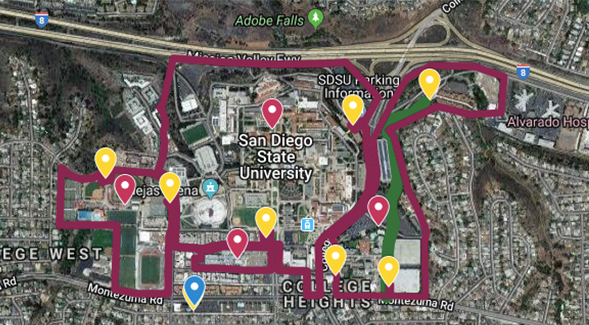Policy in 2019 Prohibits Micro-Mobility Devices on Campus
Micro-mobility companies have set up geofencing around campus, which will alert riders when they are approaching the no-ride campus zones.

Editor's Note: In 2019, SDSU implemented a policy prohibiting mico-mobility devices on campus. That policy was updated in 2024, allowing commercially shared electric or motorized skateboards, scooters, bicycles, or other non-human propelled micro-mobility devices to be used on campus if the commercial entity has a current operating contract with the university.
Beginning fall 2019, the use of electric or motorized dockless scooters, bicycles, roller skates, hoverboards, skateboards and other micro-mobility devices is prohibited on the San Diego State University campus.
Students will be able to use the alternative transportation source to commute to and from campus, but they are not permitted to operate the devices within university grounds, with the exception of eight designated parking areas.
“The new policy was enacted to ensure the safety of our campus community was a top priority,” said Parking and Transportation Services (PATS) Director Debbie Richeson. “However, we recognize that micro-mobility is a favored and accessible form of alternate transportation and we want to support this mode of transportation to and from campus.”
Why are motorized devices being prohibited on campus?
A report compiled by PATS showed a 22% increase in incidents involving bicycles, scooters and skateboards - both motorized and manual powered - on campus between 2017 and 2018. This prompted the formation of a shared governance committee composed of students, academic senators, Enrollment Services, Student Affairs, and others to explore a new policy for the devices.
Following concerns for both pedestrian and rider safety on campus, and in response to instances of accidents involving electric or motorized scooters across the country, the University Senate voted to change the university’s active transportation policy and prohibit “micro-mobility” transportation on campus. The policy was officially approved in March 2019.
How will the new policy be enforced?
Micro-mobility companies have set up “geofencing” around campus, which will alert riders when they are approaching the “no-ride” campus zones. Once the rider enters the geofence, the device will begin to slow significantly.
If a rider attempts to bring the device inside of the geofence, the respective device app will block the rider from ending the ride. Users will receive a notification that they must park the motorized device in a designated zone. As part of the policy, designated parking zones, bordering the geofence, have been constructed.
The new policy does not apply to manual powered micro-mobility devices. Personal motorized micro-mobility devices owned by faculty, staff, students and campus visitors will be required to be powered down on campus. Those who operate personal motorized devices on campus will be fined $75. Electric or motorized bicycles may be used on campus if powered off.
Additionally, the use of non-motorized scooters, bicycles and skateboards on the bike lanes or curbed campus roadways is still permitted and unaffected by the new policy.



